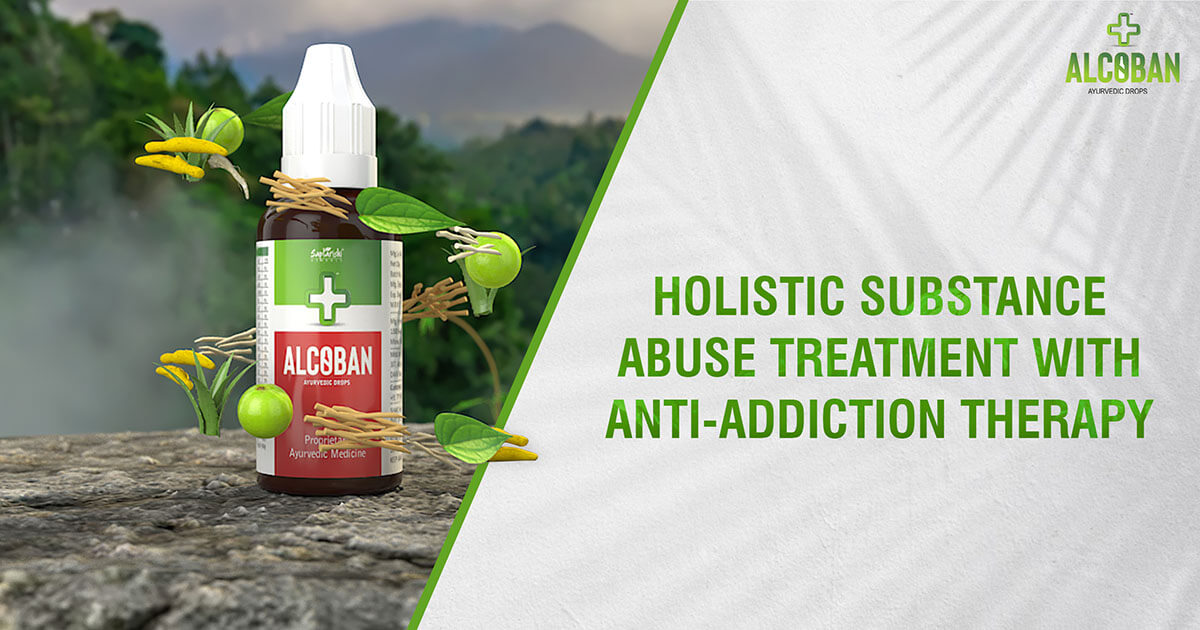Alcobanplus

In the field of substance abuse treatment, the combination of Ayurvedic principles with anti-addiction therapy represents a harmonious blend of ancient wisdom and modern therapeutic approaches. Ayurveda, an ancient system of medicine that originated in India, views health as a balance of mind, body, and spirit. By combining Ayurvedic holistic practices into the treatment of substance abuse, individuals can assess the physical aspects of addiction but also find the underlying imbalances contributing to the issue.
Ayurveda, translated as the "science of life," is founded on the belief that each individual is unique and comprises a distinct combination of the three doshas—Vata, Pitta, and Kapha—which govern various physiological and psychological aspects. According to Ayurveda, when these doshas are in harmony, an individual experiences optimal health, but imbalances can lead to ailments, including addiction.
Ayurvedic philosophy suggests that dosha imbalances, often resulting from lifestyle choices, diet, and emotional factors, can contribute to substance abuse. For instance, an excess of Vata dosha might manifest as anxiety and restlessness, pushing individuals towards substances that provide temporary relief.
Holistic substance abuse treatment rooted in Ayurveda begins with a thorough assessment to identify an individual's unique constitutional dosha and the specific imbalances contributing to addiction. This personalized approach allows for a targeted treatment plan that addresses the root causes of substance abuse.
While Ayurveda provides a foundational understanding of the imbalances within an individual, anti-addiction therapy complements this holistic approach to the psychological and emotional aspects of addiction. By combining these two approaches, individuals receive a complete treatment that not only aids in overcoming the physical dependency on substances but also supports the cultivation of a balanced and healthy lifestyle.
In the context of Ayurvedic holistic substance abuse treatment, Cognitive Behavioral Therapy can be integrated to address negative thought patterns associated with addiction. Ayurveda emphasizes the connection between the mind and body, recognizing that imbalances in mental health can impact overall well-being.
Ayurveda places a strong emphasis on mindfulness and stress reduction as integral components of holistic well-being. Ayurvedic practices such as meditation and mindful breathing become powerful tools for individuals in recovery. These practices enhance self-awareness, aid in managing stress, and contribute to a balanced mental state.
Ayurvedic principles can enhance the effectiveness of Motivational Enhancement Therapy by aligning with the Ayurvedic concept of 'Sattva,' or purity of mind. MET, when infused with Ayurvedic motivation, taps into an individual's intrinsic desire for a balanced and pure life, fostering a commitment to positive change.
Ayurvedic detoxification involves purifying the body using natural methods, such as Panchakarma, an Ayurvedic cleansing process. This approach aids in eliminating toxins accumulated through substance abuse and restores balance to the doshas.
Based on the Ayurvedic assessment, a personalized treatment plan ismade, combining anti-addiction therapies and Ayurvedic practices. This individualized approach recognizes the uniqueness of each person's constitution and treatsthem accordingly.
In addition to traditional therapeutic approaches, holistic substance abuse treatment with an Ayurvedic foundation may include Ayurvedic modalities like herbal supplements, yoga, meditation, and dietary recommendations. These practices enhance overall well-being and contribute to sustained recovery.
Ayurveda emphasizes the interconnectedness of individuals with their environment, including family. Family involvement in the treatment process is enriched by Ayurvedic principles, fostering support and understanding to aid the individual's recovery journey.
Holistic substance abuse treatment extends beyond rehabilitation, incorporating Ayurvedic principles into aftercare plans. Continued practices such as the Ayurvedic diet, lifestyle recommendations, and mindfulness techniques contribute to sustained well-being and relapse prevention.
Holistic substance abuse treatment recognizes the significance of balance in mind, body, and spirit. By addressing imbalances of dosha and integrating anti-addiction therapies, individuals experience comprehensive healing that goes beyond mere abstinence.
The working together of Ayurveda and anti-addiction therapy encourages the cultivation of lasting lifestyle changes. By addressing the root causes of addiction and providing tools for sustained well-being, individuals are empowered to embrace a balanced and healthy life.
The fusion of Ayurvedic principles enhances resilience and emotional well-being. Individuals learn to manage stress, emotions, and cravings through a holistic approach that nurtures mental and emotional balance.
Ayurvedic holistic substance abuse treatment stands out for its personalized approach. Each individual's constitutional dosha is considered, ensuring that treatment is fitted to their unique needs, promoting effective and sustainable recovery.
Alcoban is a natural remedy for helping people quit habits like drinking alcohol or using tobacco. It follows the ancient Ayurvedic principles and formulas. Alcoban Plus is special because it makes people feel a bit sick and uncomfortable when they consume alcohol or tobacco. This helps them avoid these habits.
What's unique about Alcoban Plus is that it can be added to food or drinks without the substance abuser noticing. It doesn't have a strong color, smell, or taste, so it can be given without them knowing.
Ayurvedic treatments are known for being safe with very few side effects, and Alcoban Plus continues this tradition.
Ayurvedic holistic substance abuse treatment, coupled with anti-addiction therapy, offers a unique and comprehensive approach to overcoming addiction. By harmonizing ancient wisdom with modern therapeutic techniques, individuals can understand the physical aspects of substance abuse and also promote balance and well-being in all dimensions of their lives.
